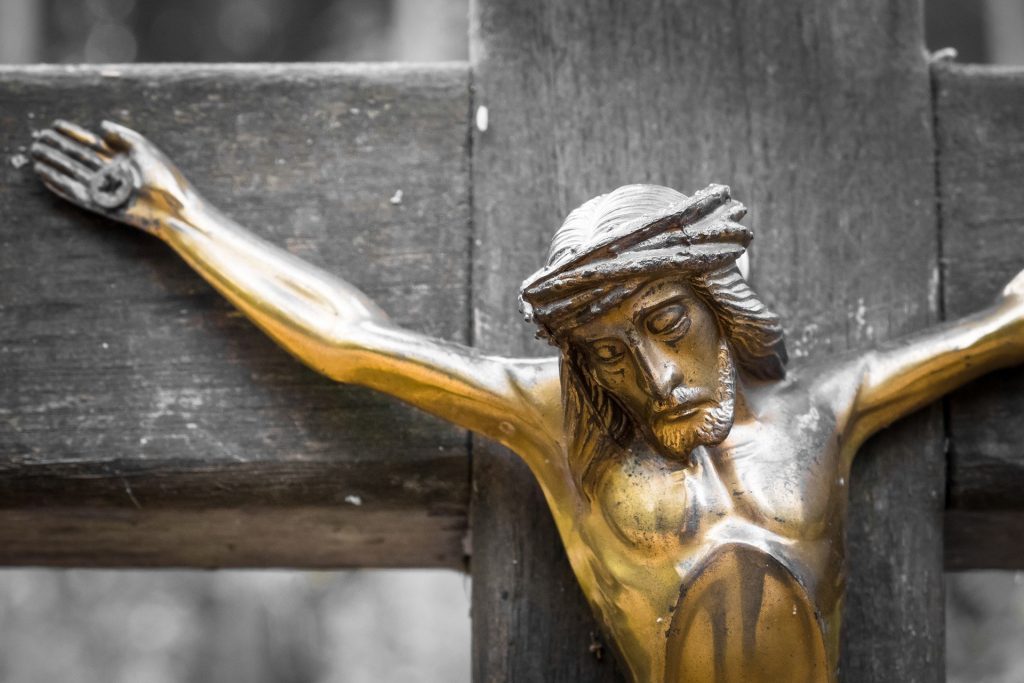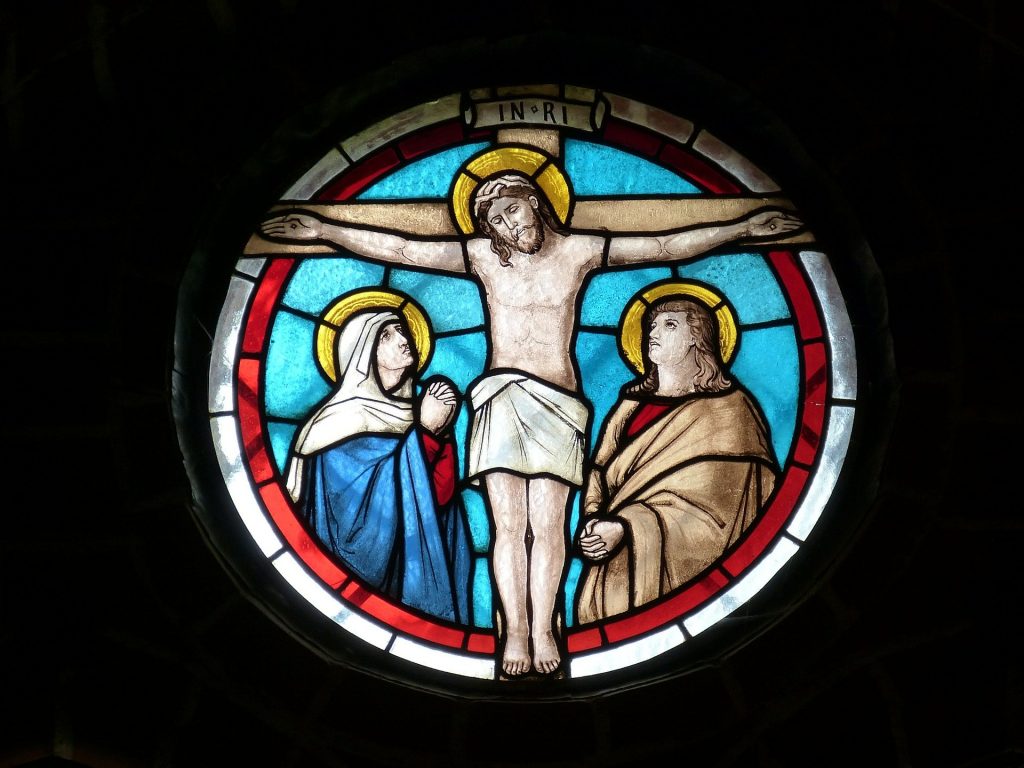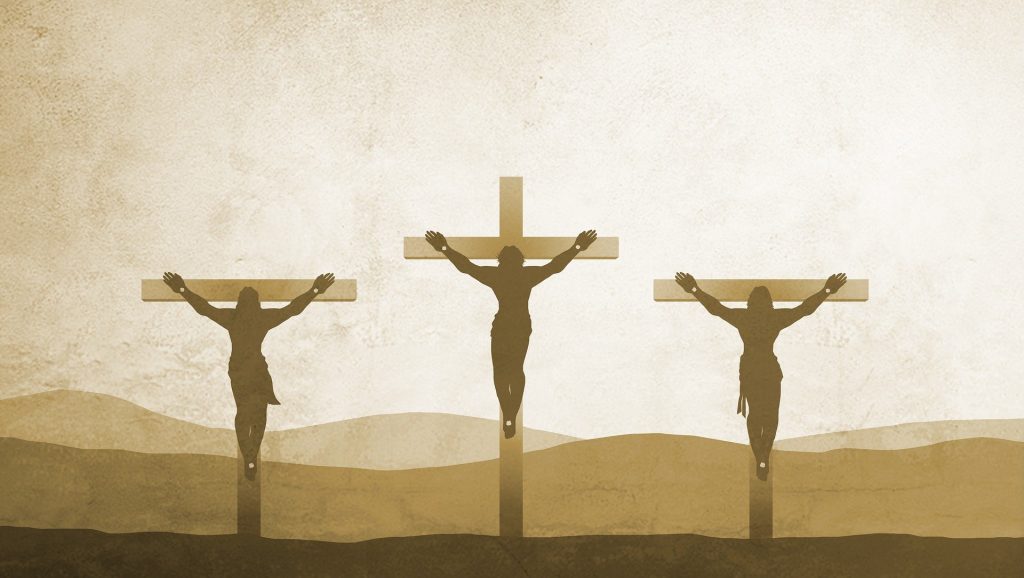“Paid In Full” – The Message Of The Cross

Two thousand years ago, on a grim and sombre Friday morning, three men were executed by crucifixion on a hill outside Jerusalem. Two of them were convicted robbers, and, as was the custom, their crosses probably bore inscriptions to that effect. But on the cross that stood in the middle, the only charge that was conspicuously displayed was “Jesus Christ, King of the Jews”. Three times that morning he had been sent for trial before the Roman authorities, and each time he had been found innocent. Yet after his third trial, he was nevertheless handed over for execution. One may ask why a man who had been found innocent three times should end up being put to death. The Bible provides some answers.
The death of Jesus Christ was engineered by the religious leaders of the day, who pressurized the Roman governor to give him up to be killed. Many of these leaders were using religion as a means of exploiting the ordinary people (Matt. 23:4, Mk. 12:38-40, Lk. 11:52). They loved to appear righteous before men, but their hearts were far from God (Matt. 23:1-7, 27-28). They purported to be the upholders of the law of God, but often they put their own man-made traditions above God’s law (Matt. 15:1-14). They took offence at Jesus because he often healed people on the Sabbath, which, according to their warped interpretation of the law, was a violation of God’s commandment. Instead of rejoicing over the healing of the sick, they plotted to kill Jesus because they considered that by performing such miracles he was working on the Sabbath, something the law prohibited (Jn. 5:8-16). At the same time, they envied Jesus because of his popularity with the people (Mk. 11:18, 15:9-11, Matt. 27:17-18). Moreover, Jesus did not hesitate to criticise them boldly, and this incensed them all the more (Lk. 11:37-54, 20:9-20, Mk. 12:1-12).
But perhaps the most significant reason why the religious leaders wanted to kill Jesus was because he made hitherto unheard-of statements which put him on a par with the Almighty God (e.g. Jn. 5:17-18). On one occasion he declared “I and my Father are one”, and immediately they picked up stones to stone him. When Jesus asked them for which of his good works they were trying to kill him, they answered “We are not stoning you for any of these, but for blasphemy, because you, a mere man, claim to be God” (Jn. 10:29-33). After his last supper with his disciples, when one of them asked him “Lord, show us the Father and that will be enough for us”, Jesus replied, with a hint of surprise, “Don’t you know me, Philip, even after I have been among you such a long time? Anyone who has seen me has seen the Father” (Jn. 14:6-9). When he was arrested and brought before the religious leaders, they considered him “worthy of death” precisely because he plainly declared under oath that he was the Son of God (Matt. 26:62-66, Lk. 22:67-71, Mk. 14:60-64 ). In effect, they pressurized the Roman authorities to have him killed because he claimed to be divine (Jn. 19:7). Indeed, as he hung on the cross, they taunted him with the words “Come down from the cross, if you are the Son of God” (Matt. 27:39-43, Lk. 23:35).

If Jesus was the Son of God, why did he have to die?
The death of Jesus Christ was God’ s will. Many things in Jesus’ life had been predicted hundreds of years before in prophecy. In Isaiah 53, the prophet, writing about Jesus some 700 years earlier, says: “He was assigned a grave with the wicked, and with the rich in his death, though he had done no violence, nor was any deceit in his mouth. Yet it was the LORD’s will to crush him and cause him to suffer ” (Isaiah 53:9-10a).
Jesus himself predicted his own death. In Matthew 16:21-23, we read that Jesus began to explain to his disciples that he must go to Jerusalem and be killed. When Peter, out of human loyalty, declared to Jesus that this would never happen to him, Jesus sternly rebuked him, saying “You do not have in mind the things of God, but the things of men”, thus confirming that it was God’s will for him to die. Again when one of his disciples tried to defend him at the time of his arrest, Jesus said that he could call on his Father and immediately more than twelve legions of angels would be sent to defend him. But then he asks “how then would the scriptures be fulfilled that say it must happen in this way?” (Matt. 26:52-54).
The Bible also declares that Jesus did not die on his own account, but on behalf of all mankind. Hebrews 2:9 says that Jesus “suffered death, so that by the grace of God he might taste death for everyone.” In 2 Cor. 5:15 we read that “he died for all, that those who live should no longer live for themselves but for him who died for them…”. This statement is echoed in 1 Thessalonians 5:10: “he died for us so that, whether we are awake or asleep, we may live together with him”.

But why did he have to die for us?
The Bible says “man is destined to die once, and after that to face judgment” (Hebrews 9:27). Our natural fear of death is related to our innate awareness that we are not ready for judgment. The many religions in existence show man’s instinctive belief in a higher being to whom we are responsible, and to whom we must give account. The fact that most religions try to teach ways in which we may be found acceptable by this higher being indicates that mankind is aware that he falls short of the standards required of him.
The Bible calls this falling short “sin”. Romans 3:23 says “for all have sinned and fall short of the glory of God”. The Bible also explains that death is a direct consequence of sin, which originated with the first man, Adam. God created Adam and placed him in a beautiful garden where he could enjoy countless blessings. Over and against the many things he was allowed to do, there was one thing he was commanded not to do. God told him “You are free to eat of any tree in the garden; but you must not eat from the tree of the knowledge of good and evil for when you eat of it you will surely die” (Genesis 2:16b-17). In Ezekiel, God reiterates this warning when he says “the soul who sins … will die” (Ezek. 18:4,20). Unfortunately, Adam yielded to the deception of the devil and disobeyed God, with terrible consequences for himself and all mankind.

Adam’s sin caused him to become cursed with enmity between man and the devil, strife between man and woman, hard toil and unproductivity in his labors, and banishment from the presence of God (Genesis 3:14-24). Furthermore, by obeying the devil, he brought himself under the power of the devil and forfeited dominion over the world to him (Eph. 2:1-2, 1 Jn. 3:8, 1 Jn. 5:19). Through his sin he also became a slave to sin (Jn. 8:34, Rom. 6:16, 7:14). Clearly, the death that God warned Adam about involved much more than physical death, although Adam did eventually experience that as well. It involved being separated from the presence and the favor of God for the present and, eventually, for eternity.
Furthermore, according to the Bible, all mankind have inherited the spiritual condition of our forefather Adam. Through natural birth, we have inherited the sinful nature of Adam, and the accompanying state of spiritual death. Romans 5:12 asserts that “…sin entered the world through one man, and death through sin, and in this way death came to all men, because all sinned…”. Verse 14 continues “Nevertheless, death reigned from the time of Adam to the time of Moses, even over those who did not sin by breaking a command, as did Adam.” This indicates that the sentence of death hangs equally over those whose sins may only have been in their thoughts, rather than in their actions. That is why the Bible declares “there is no-one righteous, not even one” (Rom. 3: I0).
The Bible very clearly points out the universal guilt of man, and his inability to rise to a right standing before God. As noted earlier, Romans 3:23 declares that “All have sinned and fall short of the glory of God”. We also read in Galatians that “the Scripture declares that the whole world is a prisoner of sin” (Gal. 3:22). Even those who have the written law of God are shown to fall short of God’s standards, so that “every mouth may be silenced and the whole world held accountable to God” (Rom. 3:19). Not only are all mankind guilty before God, we are also unable to erase this guilt by our own efforts. All our good works cannot restore our flawed nature back to its original sinless state. All our efforts cannot take away the sentence of eternal death that hangs over us. As the Bible says, “no-one will be declared righteous in his sight by observing the law” (Romans 3:20). When we consider the perfect holiness of God, we can only share in the sentiments of the prophet Isaiah “All of us have become like one who is unclean, and all our righteous acts are like filthy rags” (Isaiah 64:6).

It is precisely because of the universal guilt and the universal helplessness of mankind that Jesus Christ chose to die in our place. In his suffering and death, he experienced in himself the judgment of God which hung over the whole of humanity, from Adam till the end of the world.
Again, this had been clearly prophesied by the prophet Isaiah some seven hundred years earlier. Talking about Jesus, he wrote “But he was pierced for our transgressions, he was crushed for our iniquities; the punishment that brought us peace was upon him, and by his wounds we are healed. We all, like sheep, have gone astray, each of us has turned to his own way; and the LORD has laid on him the iniquity of us all” (Isaiah 53:4-6).
As Christ hung on the cross, God executed upon him his judgment for every sin of every human being, from Adam and Eve right through to the last person who will live on the earth. As God poured out his wrath against sin upon Jesus on that awful Friday, the whole land was plunged in darkness (Matthew 27:45-46), even though it was early afternoon. This was probably symbolic of God turning his back on Jesus, putting him through that separation from God which is the consequence of sin, causing Jesus to cry out “My God, my God, why have you forsaken me?” (another prophetic quotation, from Psalm 22:1). And as he drew his last breath, the original Greek of the New Testament quotes Jesus as saying “Tetelestai!” This expression, though it has been translated, “It is finished” (Jn. 19:30), was also a common expression in commerce, with the meaning “Paid in full”. By his death on the cross, Jesus Christ made full payment for all the sins of every member of the human race (1 Jn. 2:2, 1 Tim. 2:5-6). Truly, our debt is paid in full.

Christ is qualified to die for us because on the one hand he is truly man, born as a baby, possessed of flesh and blood, growing into adulthood. As a man, he can therefore represent the human race before God as one of us (Heb. 2:14-18). On the other hand, Christ is able to die for all mankind because he is truly God. Only a divine person could live a perfect human life without sin and stand before the Father as a worthy substitute and intercessor for sinful man (Heb. 4:14-16). Christ is able to “taste death for everyone” because he is one with God, in whom all men “live and move and have their being” (Acts 17:28). Only an infinite God could take upon himself the sins of all men and experience the judgment due to all men. And only the Source of all humanity could embrace all humanity in his life and death, since we all proceeded from him.
This is the good news about that momentous day we call Good Friday: that Christ Jesus, the Son of God, suffered and died on the cross for our sins so that we may be reconciled to God. But the good news is not just that Christ Jesus died for us, but that he rose again from the dead – for us. By this he gave further proof of his divinity (Rom. 1:4), and demonstrated that his sacrifice for our sins had been accepted by God (1 Cor. 15:17-20, Heb. 10:10-14). And now he freely offers to all who will receive it a new life that includes victory over sin and death. As he said in John 11:25, “I am the resurrection and the life. He who believes in me will live, even though he dies.” In Christ we inherit eternal life, a life that is victorious over death.
We inherit our human nature from Adam through natural birth. But we inherit a new nature from Christ through spiritual birth (Jn. 3:3-8). This spiritual birth happens through faith, when we truly believe in our hearts that Jesus Christ is God and receive him as our Lord and Saviour (Jn. 1:12-14). It is a matter of choice. Just as Adam had to make a choice using his free will whether to obey or disobey God, we have to make a choice whether to put our trust in Jesus or not. Our own righteousness cannot save us. Christ alone has paid the penalty for our sin and satisfied the demands of God’s perfect righteousness. He alone can therefore offer peace with God, forgiveness of sins and eternal life as a free gift to those who believe in him and trust him as their Lord and Savior. “For God so loved the world that he gave his one and only Son, that whoever believes in him shall not perish but have eternal life” (Jn. 3:16). Anyone who wishes may put their trust in Jesus Christ and receive eternal life today.


Thanks for your indepth exposition on our Lord Jesus and reminding us of why we celebrate this season.
Thank you.
It is truly refreshing to read a well- researched, well-written, nicely grammatical piece on The Christ. This is nice. I look forward to more of this. You have set a very high standard indeed. Thanks
Thank you.
Amazing grace shall always be my song of praise! Thank you, Lord , for bearing my sin on the cross.
Dear Francis, thank you for sharing this very insightful blog. Thanks also for sharing the message on Good Friday and Easter and bringing more clarity to these events.
Regards,
Ewuradwoa
Thank you.